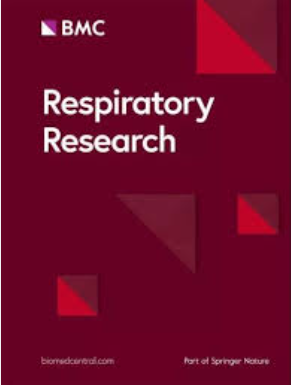Multi-omics analysis reveals overactive inflammation and dysregulated metabolism in severe community-acquired pneumonia patients
IF 4.7
2区 医学
Q1 RESPIRATORY SYSTEM
引用次数: 0
Abstract
Severe community-acquired pneumonia (S-CAP) is a public health threat, making it essential to identify novel biomarkers and investigate the underlying mechanisms of disease severity. Here, we profiled host responses to S-CAP through proteomics analysis of plasma samples from a cohort of S-CAP patients, non-severe (NS)-CAP patients, diseases controls (DCs), and healthy controls (HCs). Then, typical differentially expressed proteins were then validated by ELISA in an independent cohort. Metabolomics analysis was further performed on both the cohort 1 and cohort 2. Then, the proteomic and metabolomic signatures were compared between the adult and child cohorts to explore the characteristics of severe pneumonia patients. There were clear differences between CAP patients and controls, as well as substantial differences between the S-CAP and NS-CAP. Pathway analysis of changes revealed excessive inflammation, suppressed immunity, and lipid metabolic disorders in S-CAP cases. Interestingly, comparing these signatures between the adult and child cohorts confirmed that overactive inflammation and dysregulated lipid metabolism were common features of S-CAP patients, independent of age. The change proportion of glycerophospholipids, glycerolipids, and sphingolipids were obviously different in the adult and child S-CAP cases. The plasma multi-omics profiling revealed that excessive inflammation, suppressed humoral immunity, and disordered metabolism are involved in S-CAP pathogenesis.多组学分析揭示了重症社区获得性肺炎患者过度活跃的炎症和失调的新陈代谢
重症社区获得性肺炎(S-CAP)是一种公共卫生威胁,因此确定新的生物标志物并研究疾病严重性的内在机制至关重要。在这里,我们通过对一组 S-CAP 患者、非重症(NS)-CAP 患者、疾病对照(DCs)和健康对照(HCs)的血浆样本进行蛋白质组学分析,剖析了宿主对 S-CAP 的反应。然后,在一个独立队列中通过 ELISA 验证了典型的差异表达蛋白。代谢组学分析进一步在队列 1 和队列 2 中进行。然后,对成人组群和儿童组群的蛋白质组和代谢组特征进行比较,以探索重症肺炎患者的特征。CAP患者和对照组之间存在明显差异,S-CAP和NS-CAP之间也存在很大差异。对变化的通路分析显示,S-CAP 病例中存在过度炎症、免疫力低下和脂质代谢紊乱。有趣的是,比较成人和儿童组群的这些特征证实,过度活跃的炎症和失调的脂质代谢是 S-CAP 患者的共同特征,与年龄无关。在成人和儿童 S-CAP 病例中,甘油磷脂、甘油脂类和鞘脂类的变化比例明显不同。血浆多组学分析表明,过度炎症、体液免疫受抑制和代谢紊乱参与了S-CAP的发病机制。
本文章由计算机程序翻译,如有差异,请以英文原文为准。
求助全文
约1分钟内获得全文
求助全文
来源期刊

Respiratory Research
医学-呼吸系统
自引率
1.70%
发文量
314
期刊介绍:
Respiratory Research publishes high-quality clinical and basic research, review and commentary articles on all aspects of respiratory medicine and related diseases.
As the leading fully open access journal in the field, Respiratory Research provides an essential resource for pulmonologists, allergists, immunologists and other physicians, researchers, healthcare workers and medical students with worldwide dissemination of articles resulting in high visibility and generating international discussion.
Topics of specific interest include asthma, chronic obstructive pulmonary disease, cystic fibrosis, genetics, infectious diseases, interstitial lung diseases, lung development, lung tumors, occupational and environmental factors, pulmonary circulation, pulmonary pharmacology and therapeutics, respiratory immunology, respiratory physiology, and sleep-related respiratory problems.
 求助内容:
求助内容: 应助结果提醒方式:
应助结果提醒方式:


